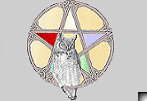
|
Main | Awards | WebRings | Banners | Credits | Links | Search |
|
|
|
|
|
Paganism One of the best sources to examine for a definition of Pagan is the Old Testament. The word Pagan is used numerous times throughout the work to refer to non-Israelites. This is an immediate tip-off that Pagan does not mean "non-Christian," as the concept of "Pagan" is used in the Bible many years before Christ is even born. We examine a bit farther to find what our disputed word does mean. The Israelites were different from rest of the world in two major ways. The first was their monotheism. Worshipping a single god was an incredibly radical idea during Abraham's life in Ur. Most people worshipped thousands of gods, from gods of the sun and the rivers and the sky to gods dealing with each individual city, profession, and time of day. Many monotheists were even ostracized, for their refusal to worship the gods of the city could bring downfall to the entire population! The other fundamental difference between the Israelites and their neighbors is not so obvious and takes an above average understanding of the Bible to comprehend. The nature of Yahweh, the god of the Israelites, and the gods of their neighbors were very different. For instance, Baal, the principal God of Abraham's neighbors, was a fertility and harvest god. Worship of him ensured a good harvest and, in turn, survival. Yahweh, however, was never worshipped particularly to ensure a good harvest. When the Israelites followed Yahweh's laws and kept the faith, Yahweh protected them from invasion. However, when they strayed from his laws and broke the covenant, they were conquered and endured hardship. This is the fundamental nature of Yahweh--a god of war and of history, not of fertility and nature. The Pagans were different from the Israelites not simply because they weren't Israelites, but because they worshipped many gods and worshipped directly in nature. We can see this in all of the societies described as Pagan in our well-taught but forgotten high school history classes--the Galls, the Romans, the Greeks, the Norse... The Biblical evidence is supported by our current English language. Yes, it is true that the Merriam-Webster Dictionary starts off its definition of Pagan with the word "heathen." This word has negative meanings to everyone. However, if we take the time to look up the definition of heathen to which it is referring, we find: This certainly does not mean "evil"! In fact, all it's really saying is that a heathen is a person who has not been exposed to the ideas of Judaism or Christianity. The Merriam-Webster definition of Pagan continues as: This supports our finding of Pagans as polytheists from the Old Testament. We can also examine the word origin that Merriam-Webster gives for Pagan: This further supports our sense of Paganism as a nature-based religion. And this is, in fact, what myself and a whole burgeoning world of Pagans (or "neo-Pagans," as we are often called) mean when we present ourselves. The fact that I am Pagan means that I follow one of many religions that are polytheistic and nature-based. I myself am Wiccan, a religion that worships both a goddess and a god and does so within a natural, fertility-based framework. Other Pagan religions include Druidism, Native American spirituality, Ancient Egyptian religion, and many others--all of which still have many followers. Copyright © 2001 Wiccan Wisdom |

